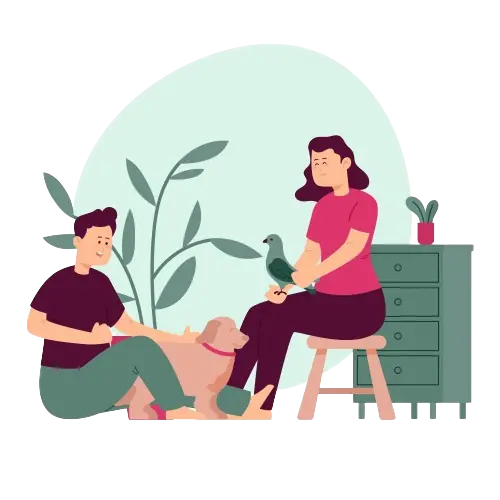Dialectical Behavior Therapy
Feeling emotionally dysregulated? Our DBT therapists can help you learn how to manage intense and unpredictable emotions, tolerate distress, & build healthy relationships.
Welcome to Town Psychological Services! We have highly trained Psychologists and Registered Psychotherapists, who offer Dialectical Behaviour Therapy (DBT), a transformative approach to mental health treatment.
What Exactly is Dialectical Behavior Therapy (DBT)?
Developed by Dr. Marsha Linehan, DBT is a form of cognitive-behavioral therapy with mindfulness practices to help individuals cope with intense emotions, improve relationships, and achieve a balanced life.
Dialectical Behaviour Therapy (DBT) is an evidence-based treatment designed to help individuals cope with intense, unpredictable, and distressing emotions. DBT helps people obtain a life worth living, learn important life skills, and develop a greater sense of self-control.
DBT is influenced by the philosophy of dialectics, which means the balancing of opposites. DBT aims to strike a balance between accepting aspects of one’s current experience, while simultaneously changing what might not be working for them.

DBT draws upon acceptance-based principles from Zen Buddhist traditions and change-based principles from behaviour therapy. DBT is a type of therapy that can help people improve their emotional regulation, distress tolerance, interpersonal effectiveness, and mindfulness. It is often used to treat people with Borderline Personality Disorder (BPD), but it can also be helpful for people with other mental health conditions, such as mood disorders, eating disorders, anger management issues, and substance use problems.
Who Needs Dialectical Behaviour Therapy (DBT)?
Dialectical Behavior Therapy (DBT) is a versatile and effective therapeutic approach that can benefit a wide range of individuals experiencing various mental health challenges. While originally developed to treat Borderline Personality Disorder (BPD), DBT has since been adapted to address the needs of diverse populations.
Here are some examples of who may benefit from DBT:
1. Individuals with Borderline Personality Disorder (BPD): DBT was initially developed to specifically target the symptoms and behaviors associated with BPD, such as unstable emotions, impulsivity, and difficulty in relationships. It remains a highly recommended treatment for individuals diagnosed with BPD.
2. People with Mood Disorders: DBT has shown efficacy in treating mood disorders such as depression and bipolar disorder. Its focus on emotion regulation and mindfulness techniques can help individuals better manage mood swings, alleviate symptoms of depression, and prevent relapse.
3. Struggling with Anxiety Disorders: DBT incorporates skills training modules that address anxiety-related symptoms, including distress tolerance and emotion regulation. Individuals with generalized anxiety disorder, panic disorder, social anxiety disorder, and other anxiety disorders can benefit from learning these coping skills.
4. Trauma-Related Disorders: Several individuals with histories of trauma, including Post-traumatic Stress Disorder (PTSD) and complex trauma, experience difficulties regulating emotions and navigating interpersonal relationships. DBT’s emphasis on safety, validation, and coping strategies can be invaluable in their healing journey.
5. Substance Use Disorders: DBT has been adapted to address the complex needs of individuals struggling with substance abuse and addiction. By teaching coping skills, enhancing motivation for change, and addressing underlying emotional vulnerabilities, DBT can support individuals in achieving and maintaining sobriety.
6. Eating Disorders: DBT skills, particularly those related to emotion regulation and distress tolerance, can be beneficial for individuals with eating disorders such as bulimia nervosa, binge eating disorder, and anorexia nervosa. DBT helps individuals develop healthier coping mechanisms and improve their relationship with food and body image.
7. Seeking Personal Growth and Wellness: Even individuals without diagnosed mental health conditions can benefit from DBT therapy in Oakville. The mindfulness-based skills taught in DBT can enhance self-awareness, resilience, and overall well-being, making it a valuable tool for personal growth and self-improvement.
How Does DBT Therapy Work?
DBT is a comprehensive treatment approach that involves both individual therapy and group skills training. In individual therapy, you will work with a Town Psychology therapist to identify your triggers and develop a coping plan for managing difficult emotions and situations.
Learn more about Town Psychology Dialectical Behavioural Therapy Skills Group.

Our DBT therapy in Oakville is guided by several core principles that form the foundation of the therapeutic process.
- Mindfulness: This skill helps you focus on the present moment and accept your thoughts and feelings without judgment.
- Distress tolerance: This skill helps you tolerate difficult emotions and situations in a healthy way.
- Emotional regulation: This skill helps you identify and manage your emotions in a healthy way.
- Interpersonal effectiveness: This skill helps you communicate effectively with others and build healthy relationships.
DBT at Town Psychological Services
Tired of Feeling Out of Control?
DBT Can Help You Self-Regulate
Benefits of DBT Therapy in Oakville
The benefits of DBT are manifold and extend beyond symptom reduction:
- Improved Emotional Regulation: Enhanced ability to manage and regulate emotions effectively.
- Enhanced Interpersonal Relationships: Better communication skills and healthier relationships with others.
- Increased Self-Awareness: Greater insight into one’s thoughts, feelings, and behaviors.
- Reduced Impulsivity: Decreased likelihood of engaging in self-destructive or impulsive behaviors.
- Enhanced Quality of Life: Greater overall satisfaction and fulfillment in life.
Dialectical Behavior Therapy (DBT) at Town Psychological Services in Oakville, offers essential life skills for individuals struggling with a variety of mental health challenges. By accepting the principles of acceptance and change, cultivating mindfulness, and learning practical skills, individuals can empower themselves to lead more fulfilling and balanced lives.
If you are interested in learning more about DBT, contact us at Town Psychological Services in Oakville.
Dialectical Behavior Therapy (DBT) FAQs
Is DBT just for people with BPD?
What's the difference between DBT and other therapies?
Does DBT involve medication?
What are the core skills taught in DBT?
How long does DBT typically last?
Is DBT therapy covered by OHIP?
Most of the psychological services are not covered by the Ontario Health Insurance Plan (OHIP). However, some individuals might be eligible for funding coverage for all or part of the fees through various options. Check them here
I don’t live in Oakville, ON, can I still access your DBT therapy?
Yes, we provide various psychological services including DBT therapy in Oakville. Individuals from Mississauga, Burlington, Hamilton, Milton or surrounding GTA can also take benefits. We also provide virtual services for all of Ontario. Call +1 905-616-1719 or contact us for further information.
